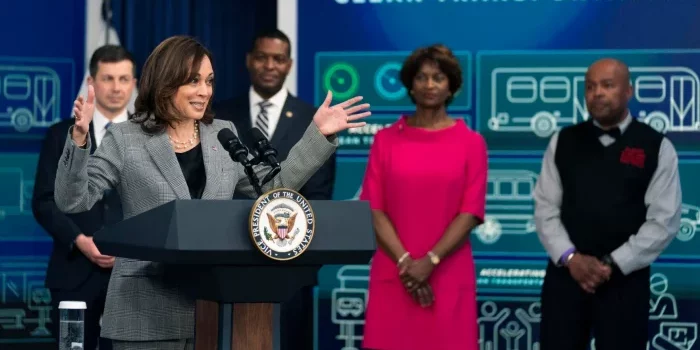(Tom Gantert, The Center Square) The U.S. Environmental Protection Agency on Thursday announced new proposed federal vehicle emissions standards critics claim will “effectively ban gasoline and diesel vehicles” while making the U.S. dependent on China.
The EPA proposal of light and heavy-duty vehicle greenhouse gas emission standards is for model years 2027-2032. The EPA projects that its proposal could reduce greenhouse gas emissions by 56% by 2032 and help increase electric vehicle light-duty sales by 67% by 2032.
“By proposing the most ambitious pollution standards ever for cars and trucks, we are delivering on the Biden-Harris Administration’s promise to protect people and the planet, securing critical reductions in dangerous air and climate pollution and ensuring significant economic benefits like lower fuel and maintenance costs for families,” said EPA Administrator Michael S. Regan, in a media release.
The American Fuel & Petrochemical Manufacturers said the EPA decision to “fixate on tailpipe emissions rather than full fuel and vehicle lifecycle is a huge error that will stymie investment and artificially cap the potential of carbon abatement for liquid fuels and vehicles on the road today.”
“EPA’s proposal to effectively ban gasoline and diesel vehicles is bad for consumers, the environment, our freedom of mobility and U.S. national security,” American Fuel & Petrochemical Manufacturers’ President and CEO Chet Thompson said in a press release.
Henry Payne, auto columnist for the Detroit News, said the Biden administration is trying to radically transform the auto energy sector.
“A century after the alcohol Prohibition era, a second Temperance Movement has formed to ban carbon-emitting products as immoral,” Payne said in an email to The Center Square. “Popular consumer items like incandescent light bulbs, gas stoves, and gas cars are targeted. The effects are already being felt as Dodge has discontinued its successful Challenger and Daytona cars, and taxpayers are transferring $7,500 to wealthier Americans to buy expensive EVs [electric vehicles].”
Payne continued: “The Biden Administration is radically transforming auto/energy sectors in a comprehensive effort to eliminate fossil fuel use. The effort appears blind to the fact that China is championing global EV adoption because they are the Saudis of battery minerals. The U.S. spent 50 years becoming energy independent and is now poised to become dependent on China for its energy sector production.”
The American Fuel & Petrochemical Manufacturers also raised concerns about being dependent on China for EVs.
“It’s unconscionable that the Administration would propose this knowing full well that China controls 80% of global battery production capacity,” Thompson said. ” … and even with robust U.S. investment to fortify our own electric grid and grow our battery supply chains by a magnitude of 10, we will not come close to overtaking China’s dominant position and will be left more dependent and financially beholden to them as a result.”
Tim Carroll, EPA spokesperson, responded to the criticism
“These proposals do not mandate or ban specific technologies; they are performance-based standards for emissions, allowing each automaker to choose what set of emissions control technologies is best suited for their vehicle fleet to meet the standards,” Carroll said in an email to The Center Square. “EPA’s analysis indicates that one pathway the industry could take is to meet the standards by increasing the percentage of electric vehicles. The proposed standards are complementary with the direction the auto industry and consumers are already headed, given manufacturers’ public announcements of plans to transition their fleets to zero emission vehicles, which are supported by the historic financial incentives under the Bipartisan Infrastructure Law and Inflation Reduction Act.”
The Michigan League of Conservation Voters applauded the EPA’s stance.
“Addressing the climate crisis will require a swift reduction in transportation pollution and the EPA’s proposed auto emissions standards are a strong step in the right direction,” said Bentley Johnson, Federal Government Affairs Director for Michigan League of Conservation Voters, in a media release.
“The EPA must now strengthen the proposed rules to reduce harmful fossil fuel emissions, something that we know is critical for the health of frontline communities disproportionately impacted by pollution sources like heavy-duty diesel trucks in neighborhoods along shipping routes. These stronger rules – combined with federal clean energy investments – will help Michigan’s automakers go further and faster toward a zero emissions future while growing jobs and opportunity in the transportation sector.”

